Obliteration Excavations 3: To Not Make It
Sometimes, when the dark sky is very clear, I look up at the Big Dipper, and search for the North Star, though I never really know how to read the constellation—this search is somehow habitual, a part of me off to some freedom from where I am now, a state of longing no matter how secure, or fixed, posted up, etc. I am engaged in an undetermined act, an act of indeterminate looking, and for some reason, until a few weeks ago, I never thought about traveling towards this star in any real actuality, that is, in walking in real life, in the direction where that star, out there, points.
To not make it, so that this thing, the reminder, says to look back, but not here—there is no time. My mother, for instance, will not reveal where she is from, or who her family is, to me. I will never know, nor understand why. This mode of looking, and knowing that one will not make it into knowing, lets in the land below the sky, the mountains behind the wide sea, an impassable bay, what cliffs, the streets, the buildings between, some mossy bog somewhere, some viperous trail, thorny bush, some imagined impossibility of no-movement, and then, not surprisingly, waking up to a power outage to write.
I do though, drive a nice car, a BMW 328i X Drive Coupe, bought fresh off someone else’s lease, and one of the things that I enjoy about this car is that it reveals a compass embedded, lightly, in the rear view mirror’s face, a calming orange N, S,W, E, or wherever I turn the wheel. It reminds me, recoils me into the exact direction I am headed. In this beautiful car, I am hooked up immediately to my Bluetooth iPhone 6 Plus, in which I love talking on my Whip’s speakerphone.
Ghost Ride the Whip.
Sometimes, on my synched phone, I have long conversations with my dear friend, the poet, theorist, novelist, and artist, M. NourbeSe Philip. We talk about so many things, mostly things having to do with the art and life of writing, and one of the questions that we often concern ourselves with is the role of the artist, black artists in particular (and this again and again and again) is an EXPANSIVE category, multiply raced, a palpitation, a seam, an invitation, mixed, migrating, migraines, miracles, and mist.
We don’t record our conversations, but I know that for me, they are seared in the resin that exists between me and the quiet of my car, and the phone, and the light of the sea, my brain, and the sun, and sometimes I stare at the waves and listen, and sometimes I drive everywhere, and if I lose the signal—too close to the sea—too high in the cliffs, I turn back to the city, to black-bodied wet suits, whites, greys, and large long and fat boards that cross-streets, man-trunks, and turns: speakerphone on.
Let them hear this in front of VERVE.
I guess we chat about possibility, the ways in which the possibility in the art must be found in addressing and attending to its rigor, language that wrecks, confronts, communication embodied as in “throttling the body,” or words; and if it must, the words must “choke the reader” as NourbeSe reports, the consequences, articulating the ruptures that need to be told.
I think about these strategies, modes of theoretical articulation and address, a black poetics that inverts, perverts, calls out, does not belong, or more significantly, does not want to.
One weapon I realize as we chat about the question of First Nation Peoples, and something around the indeterminate “I” is the absence of ground, and I ponder: Perhaps the difference between us and them, or you and I, may be realized in the desire to shake the dead body back into life, dance of death as dance of life (!) as in no ground, field of white below what is not the page, and never the form, expected.
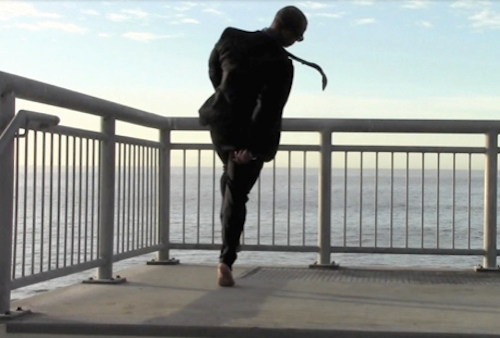
NourbeSe and I, we talked yesterday about the rejection of the lyric (her sense), the embrace (my sense), the space (our listening) of the performance in the mode as a deeply contested site, so much so, that the only thing left were these sounds that cut between birdsong and slave, singer, and traveler, and how we weep, sometimes now, and sometimes later, over different things, and at different times, but maybe always in some burning need to gather the ideation at the edges, something, too high, and too lifted up where that won’t be prized by your institution.
Eeeeeeek: An ancestral song, and exactly as I am in my luxury car, I feel somehow deeply saved in this reverberation. I think, and say, in my head, these are the super rad things that somehow protect me, this fine red body around me, can crumple and ward off, shine, invite, is so fast, too, jolts—
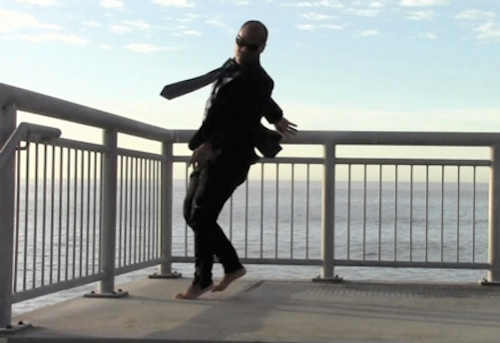
I will let you in on a secret—a secretion, actually, which is not a lament, nor is this an attack on you, or your values, at least not directly, because I love you, actually. It’s all reality based, though, so it will be easy to take. The supposition here is that the form of the essay, the site of obliteration as NourbeSe Philip reminds me, must reveal, again, the rupture.
The secret is that my luxury car’s steering wheel is heated when I press a single button settled deftly in the column. The enraged car dealer and some of the wild sales crew, (those who despised my purchasing the car on GP) indicated this at some point, but never showed me, maybe unconsciously, and his indication to reveal what he needed to show was marked further in an embodied instant, or sets of them, instances as he casually farted as Dallas, me and him walked to the back lot to show Dallas the newer than mine 1 Series BMW’s which on GP I hate because, Bitch, Please, if you are going to buy a BMW, then don’t get something that only says you drive one. Go to the light.
Paid in Full.
Whenever I teach Barthes, Butler, or Foucault, no one ever asks me if they need to read what these whites have read to inform their insights, the secondary texts that float in Pleasure, or the psychoanalytic streams that flood my eyes full in Precarious, or the long histories of Western European torture, teaching, and training grounds is Discipline and History—all the markers go unsigned, and somehow the voice, all these voices I LOVE—but none of these authors are asked by my fellow readers of their “passports,” or “glossaries,” to borrow language from Cornelius Eady’s poem, “Why Do So Few Blacks Study Creative Writing?”
It’s like ok—I’m ready to drive, now, they say. But when I teach the one and only Adrian Piper as the THEORETICAL ENGINE for my ENTIRE COURSE ON ))BLACK POETICS((—and I, TOO, did this, when I encountered her as a graduate student myself—I felt I needed to read Kant’s Critique, engage with Lewitt’s Instructions, instead of reveling and bowing down to Piper’s own. But as the art critic Michele Wallace reminds us in the form of the question: "Don’t you think their work is deeply theorized in Piper’s own?"
Word.
Sometimes you will not get there. They knew they would not get there. They understood the enormity of their situation is what NourbeSe reveals, after I ramble on about looking for the North Star and pondering my journey from my apartment, to out there, up there, into the natural world, but all from within my lovely vehicle parked on a side street, who knows or cares where I am now.
The conversation that we have is not public; it does not wage itself in explicit dialogue with any number of poets, critics, though it calls into question many poets and critics, their forms, their distinct modes, but the point of talking, in the heat, is mining, digging, into what is a sort of a shared surface, somehow suspended in the air for us to seek the material.
One might say that the conversation, at least in my imagination, is that it moves around what we share, a concern for an almost impossible rigor in contending with obliteration; or let me try to be a bit more exact—Perhaps it has to do with the possibility of realizing obliteration as a way into formulation, moving around it, inside of it, as it.
“You think we might have a little more light? …Can you see each another?” These were the first questions that Dr. Angela Davis asked of us, before giving her powerful gift of a keynote Martin Luther King Convocation speech, “Racism, Militarism, Poverty: From Ferguson to Palestine,” to a jam-packed audience at the Santa Cruz Civic Auditorium this week. Continuing to illuminate in a speech where, in part, Dr. Davis explored the international reach and cross-flow of radical activism in the face of state sanctioned police and military violence surrounding the events surrounding Ferguson, Dr. Davis asked, “Why are we seeing these mobilizations now?” She answers:
Some have assumed it is because it is because so many black men and boys have been killed in such a short period of time. But of course we need to correct that assumption….
(Applause)
Because there has been an unbroken line of racist police killings since the era of slavery…
since the era of slavery….
(Recognition, Applause…)
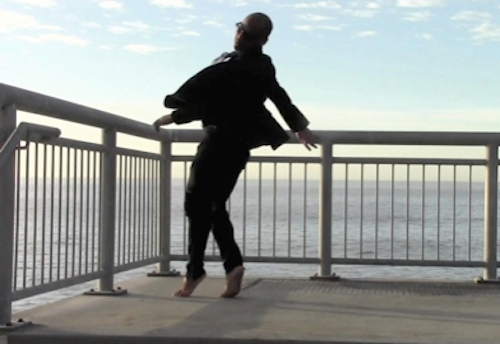
Who knows what force still moves the body dancing next to the sea, on a slab of concrete, in the sea air, not waiting to be moved, but moving. I can say I prefer to drive a car because I like to drive. But really, I do know that on a bike, I am simply less safe, and even walking too. And this morning at 2:00AM, I went for a swim, but before I entered the pool, when I told the fingerprint monitor checker at 24HR Fitness that I lived three minutes away, he said I should have walked. I said it was not safe. He said it was not Compton. I told him, in Compton, people have manners and it’s very nice, and let him know I was not poor, and walked away from him, after I called my neighborhood here in Sea Bright a Meth Site, just before or after he told me he grew up poor in some Hawaiian Hood, sigh, with his gobbling, giant Cis Fat White Boy AZZ LOL.
The difficulty in thinking of the line, again, the lyric line that floods with bodies since the era of slavery? To choke on them is what I hear, and what I remember from our conversations. How long and wide this line as I glide through the pool. How open and bloody the trail?
As I carry Angela Davis’ voice, recorded, next to my heart, the speech playing on my iPhone 6 Plus, in my breast pocket as I leave campus to ask myself how, and where will I report back to you, now:
Roland Barthes, in his pleasure of the text offers a kind of push, too:
…in this regard, the stereotype is the present path of “truth” the palpable feature which shifts the invented ornament to the canonical, constraining form of the signified. (It would be good to imagine a new linguistic science that would no longer study the origin of words, or etymology, or even their diffusion, or lexicology, but the progress of their solidification, their densification throughout historical discourse; this science would doubtless be subversive, manifesting much more than the historical origin of the truth: its rhetorical, languaging, nature.
SARA AND DENNIS HAPPEL STOP FOR A GUN AT METRO SHOOTING SUPPLIES IN BRIDGETON, MISSOURI, ON NOV. 12.
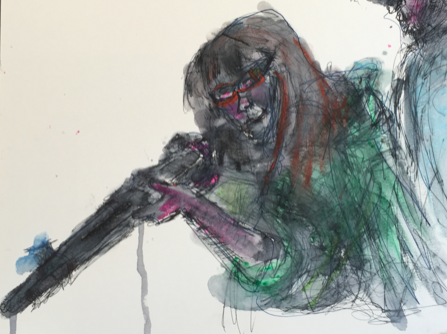
“We’re selling everything that’s not nailed down,” owner Steven King said. “Police aren’t going to be able to protect every single individual. If you don’t prepare yourself and get ready for the worst, you have no-one to blame but yourself.”
I do not get there. Fits and starts. The waiter at the East Side Eatery | Pleasure Pizza says the original drawing of this perspective shooter says the dreaming shooter looks like a “banshee,” and all I am doing is thinking about how to “get,” her. This as the site of analysis that I would like to explore, that there is something staggering in the repetition of bodies, a line that is, for me, a list of explosions, parts, a field of them, the site of obliteration as sound and texture and that which must be written, however it comes, languaging.
I am escaping towards freedom away from it, and the terrain keeps bringing me to the site again and again, but I am not getting it right, and I am not making it, but trying!
Though I am hopeful. Adrian Piper is instructive in the way that she describes, “riding with the material,” in working through conceptual modes. She says that, “The material form provides a public perceptual language…
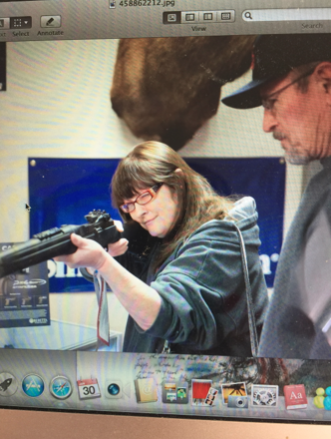
CEO: Weird..pretty good
She doesn’t look nearly as
demonic in real life
ME: She buying pre ferguson verdict
CEO: Kinda like that Keanu movie
where he was a lawyer working
for the devil
Poet Ronaldo Wilson earned an BA at the University of California-Berkeley, an MA at New York University...
Read Full Biography

